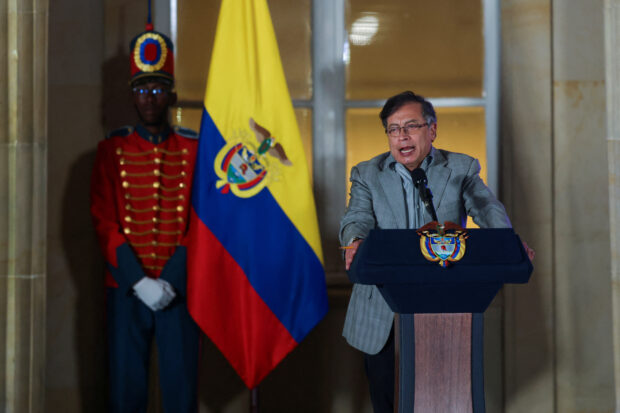Colombian president suspends ceasefire with criminal group

Colombia’s President Gustavo Petro speaks on the day of a presentation of the labor reform that his government wants to carry out, in Bogota, Colombia March 16, 2023. REUTERS FILE PHOTO
BOGOTA — Colombian President Gustavo Petro on Sunday said he had suspended a ceasefire with the Clan del Golfo, the country’s largest criminal organization, because it had attacked police.
“I have ordered the armed forces to reactivate all military operations against the Clan del Golfo,” Petro said in a tweet. “We will not allow them to continue sowing anxiety and terror in the communities.”
The ceasefire with the Clan, also known as the Gaitanista Self-Defense Forces (AGC), was part of efforts to end the group’s part in Colombia’s internal conflict, which has killed at least 450,000 people. Announced on New Year’s Eve, it was scheduled to last six months.
Days earlier, in a radio interview on March 13, Petro accused the group of destroying a municipal aqueduct in Antioquia province amid roadblocks connected to protests by informal gold miners. Petro said at the time that the group had “broken the ceasefire” and there was no possibility of negotiations with the group if they continue attacks.
Earlier on Sunday, authorities reported that six vehicles were burned in the Bajo Cauca area in the department of Antioquia, in an event allegedly linked to the mining protest.
Article continues after this advertisementDefense Minister Ivan Velasquez told reporters on Sunday night that the government had no doubt that the Clan was responsible for the violent act as well as a rifle attack against law enforcement, which Petro had referenced in a tweet earlier in the day.
Article continues after this advertisementVelasquez said that military forces and the national police had been given orders to develop “offensive operations against the Clan del Golfo.” He added that there were over 10,000 members of law enforcement in the region.
To avoid similar incidents, Velasquez urged truckdrivers passing through conflict zones to join scheduled caravans that would be protected by security forces.
As part of his peace plan, Petro has asked Congress to pass a law approving surrender for gangs, including reduced prison sentences, in exchange for halting operations and paying reparations to victims.
RELATED STORIES
Colombia, Ecuador agree joint plan to tackle organized crime on border
Colombia arrests two more over killing of Paraguay prosecutor